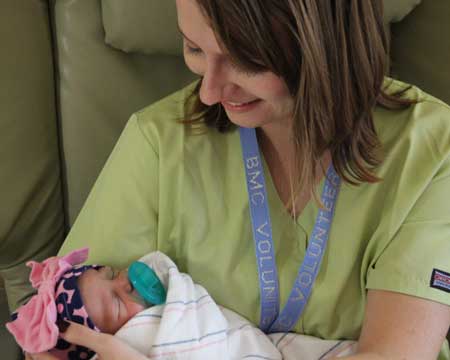When you hear the words "substance use disorder," (SUD) the image of a male immediately comes to mind for most people. That's understandable. In this country the SUD rate for males ages 12 and older is 10 percent versus 5.7 percent for females, according to Results from the 2014 National Survey on Drug Use and Health.
But there's another group of individuals dependent on opiates who are not initially counted. Newborns. The uptick in maternal opioid use has resulted in a dramatic increase in a drug withdrawal syndrome in newborns called neonatal abstinence syndrome, or NAS. The opiates pass through the placenta that connects the baby to the mother before birth. As a result, the baby becomes dependent on the drug as well. There has been a 5-fold increase in NAS since 2000, according to the National Institute of Drug Abuse. Every 25 minutes a baby is born suffering from opioid withdrawal.
 A BMC cuddler program volunteer
A BMC cuddler program volunteer"Symptoms occur within two to three days after birth," explained Elisha A. Wachman, M.D., a neonatologist at Boston Medical Center, home of the Grayken Center for Addiction. "All have manifestations of NAS, but not all require [medication] treatment." Symptoms are primarily neurological in nature. The baby may experience irritability, tremors, poor sleeping, difficulty eating, vomiting or diarrhea. The most recent available data suggest that twelve percent of all NAS babies in the state are cared for by BMC.
In many hospitals babies born with NAS are treated with methadone in the neonatal intensive care unit, but Wachman explains a different approach practiced at BMC. Parents are the primary caretakers. "Cuddling is the first line of treatment," she explained. "We make sure they are sleeping, eating and comfortable. We hold them a lot and keep the lights low." Babies born with NAS are making strides. Following a week of conservative treatment, only 30 percent of the infants require methadone because of continued symptoms of withdrawal. This plan of treatment also significantly decreases the cost of care.
In addition to caring for babies with NAS, BMC works to ensure a safe delivery for pregnant women with SUD, many of whom are initially treated in BMC’s Project RESPECT, an acronym for Recovery, Empowerment, Social Services, Prenatal care, Education, Community and Treatment. The program provides a combination of obstetric care and substance use disorder treatment for pregnant women and their newborns. The multi-disciplinary team includes obstetricians qualified to administer buprenorphine, which reduces symptoms of withdrawal, a psychiatrist specializing in mood disorders in pregnancy, an addiction psychiatry nurse practitioner and a licensed independent clinical social worker.
“Relapse prevention and engagement in recovery treatment are our biggest initial challenges,” explained Kelley A. Saia, M.D., director of Project RESPECT. “We mainly manage methadone, buprenorphine, benzodiazepines and other mood stabilizers.” Each patient is managed individually.
Patients face their share of challenges in addition to SUD. “These women are often overwhelmed by housing instability, food insecurity, safety issues and intimate partner violence,” explained Saia. “Our patients are often less able to handle illness.” Research suggests that substance use may effect women differently from men. Some women may experience heart and neurological problems. Others are more likely to have anxiety or depression or be victims of domestic violence. That is one of the reasons that the participants in RESPECT have a consult with the program’s addiction psychiatry nurse practitioner, explained Saia.
There is also an increased possibility of pregnancy-related complications. “Recent data … find alarming rates of maternal mortality due to substance use,” said Saia. They also have higher risks of hemorrhage, hypertension and pulmonary embolism. The challenges do not end with child birth. “Our biggest concern is how to help a new mother early in recovery to manage sobriety, motherhood, earn an income [and] provide for herself and her family,” Saia explained. The biggest risk is relapse and overdose.
Because of this concern Saia and her colleagues maintain close contact with the mothers the first four to six months after delivery. They are then transitioned to a primary care physician who has training in addiction. Planning is in the works to follow women for 12 months after delivery.
These services for pregnant women with SUD have met with great success. In Project RESPECT, medication stabilization has improved from 27 to 100 percent at four weeks according to the program’s last quality assessment review. This is an important step in treatment, as this phase establishes the minimum dose of medication required to avoid symptoms of withdrawal.
Project RESPECT, innovative treatments for NAS, and many other substance use programs at BMC are the backbone of the Grayken Center for Addiction, a leader in the treatment, prevention, research and training for substance use.
Media Contact:
communications@bmc.org en
en 
 Français
Français Deutsch
Deutsch Italiano
Italiano Español
Español Tiếng Việt
Tiếng Việt Kreyol ayisyen
Kreyol ayisyen